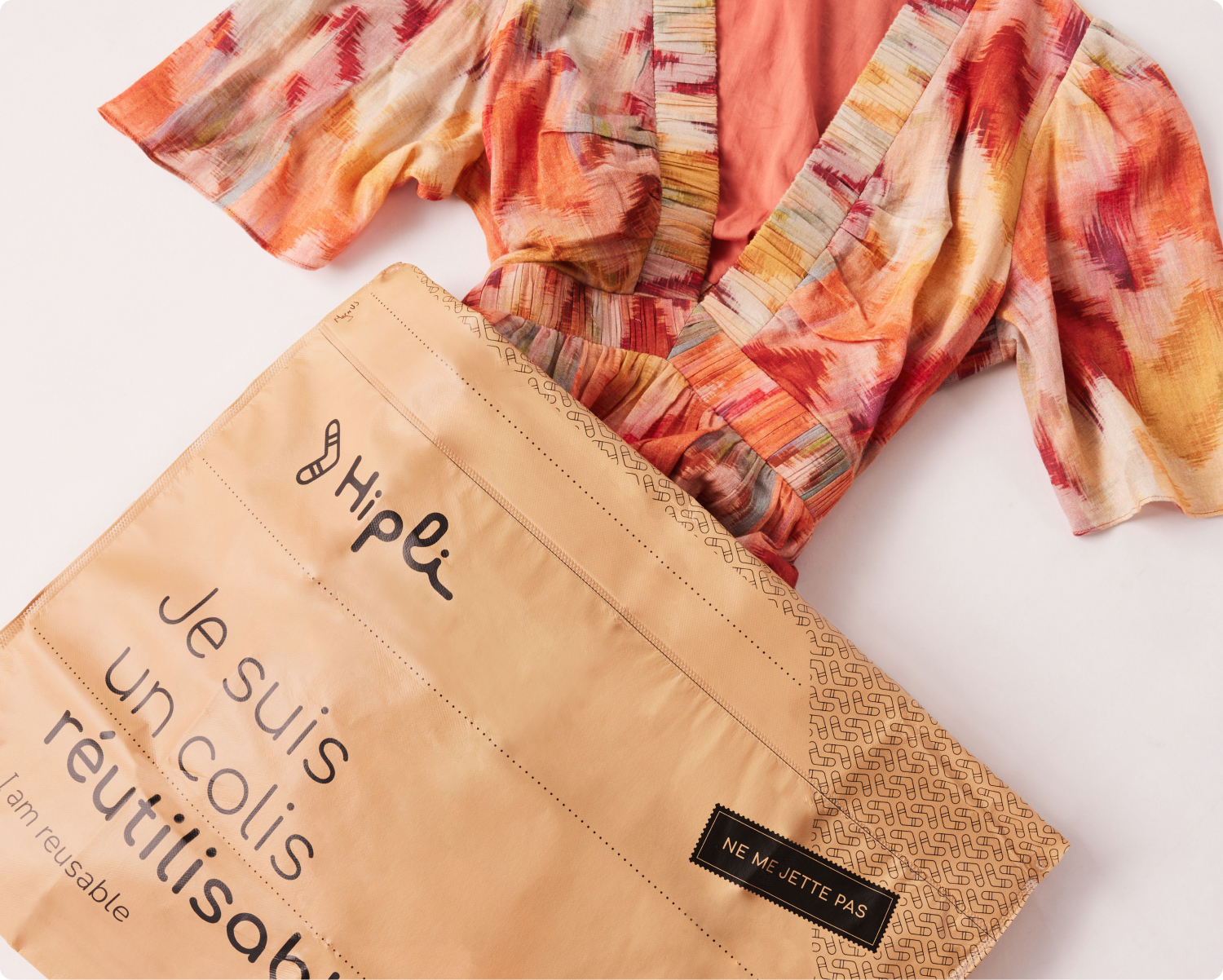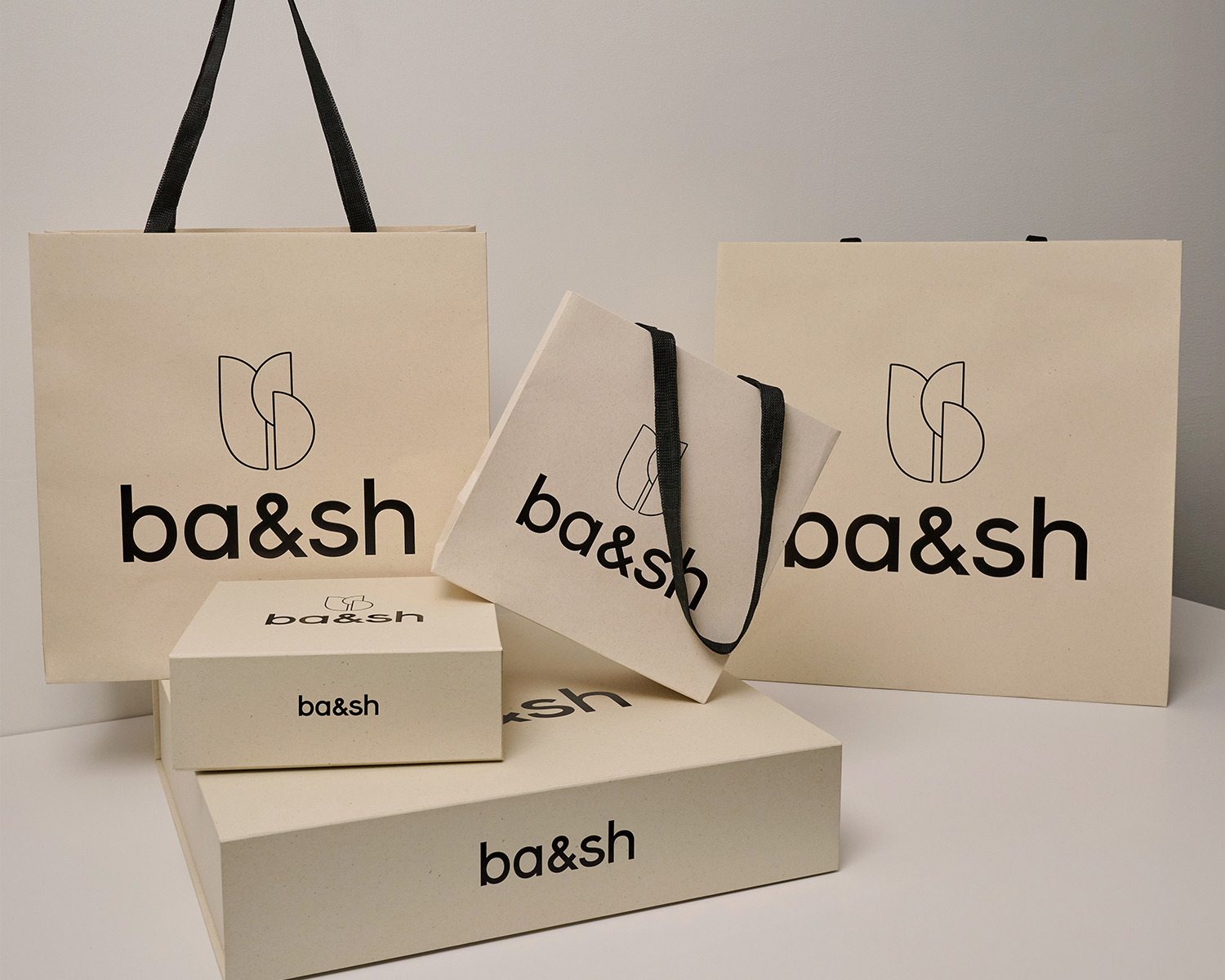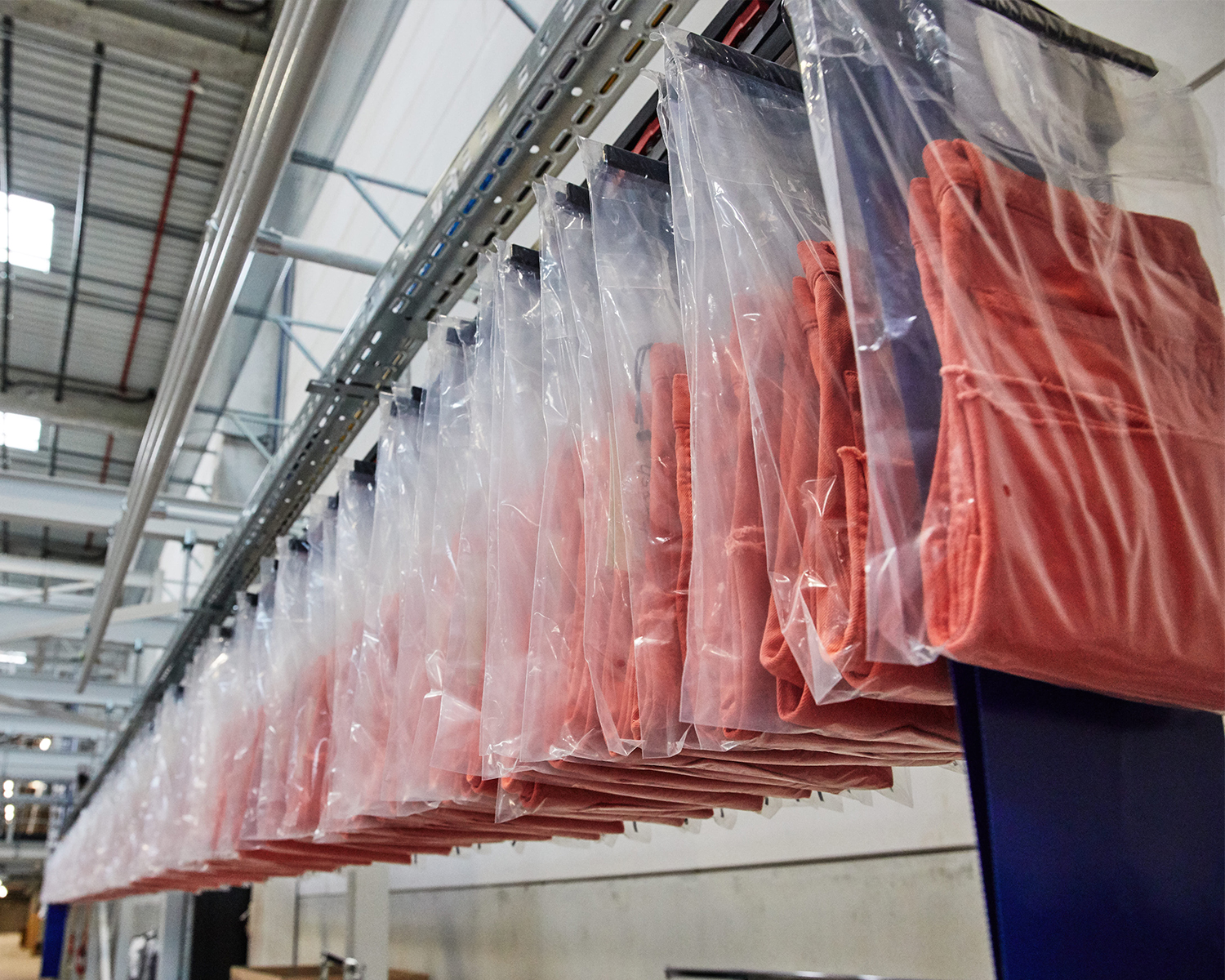

To walk on the bright side means working to reduce our impact on the climate, biodiversity and water all at once, since these environmental issues are intrinsically linked - and our business depends on all three.
It means better understanding, mapping out and measuring our impacts.
It means taking action to reduce our impact, starting where we have the most room for improvement.
It means seeking and contributing to the development of innovative solutions to do better.
To walk on the bright side means working to reduce our impact on the climate, biodiversity and water all at once, since these environmental issues are intrinsically linked - and our business depends on all three.
It means better understanding, mapping out and measuring our impacts.
It means taking action to reduce our impact, starting where we have the most room for improvement.
It means seeking and contributing to the development of innovative solutions to do better.
#Justfacts
ba&sh's carbon
footprint in 2024
Since 2021, ba&sh has been calculating its carbon footprint for the previous year every year, using the GHG Protocol methodology, and covering all its direct and indirect activities;
In 2024, ba&sh's activities generated 65,575 tonnes of CO²e, equivalent to driving around the world 7,528 times or flying 37,020 times between Paris and New York.
Between 2023 and 2024, ba&sh reduced its carbon footprint by 5%, or 11,461 tonnes of CO₂.
This reduction has been made possible thanks to 4 key action levers: the increase in the proportion of certified materials in our collections, the reduction in air transport, the reduction in production volumes and the use of renewable energies for part of our boutiques, our warehouse and our head office.
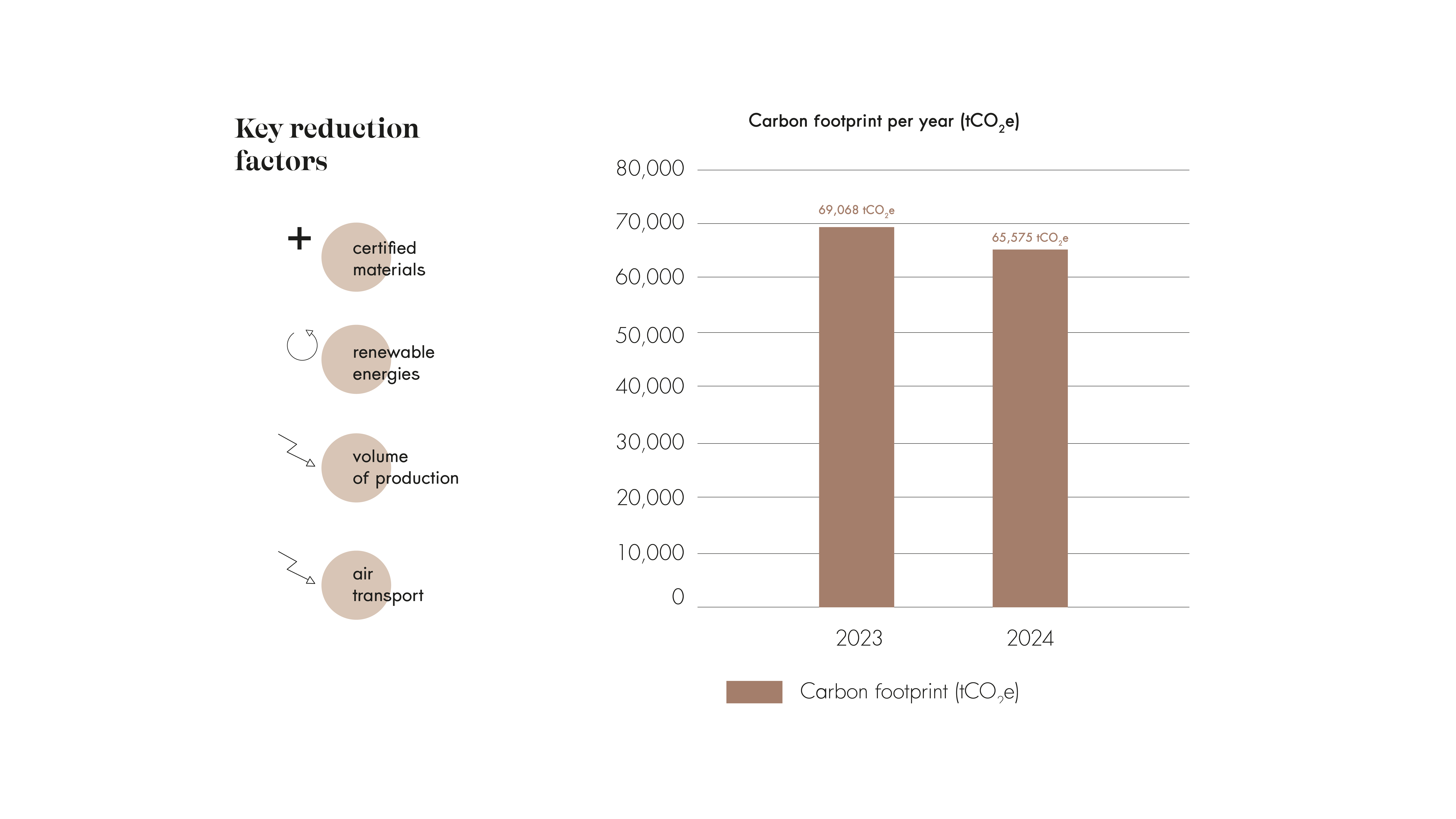
Breakdown of CO₂e
emissions by category
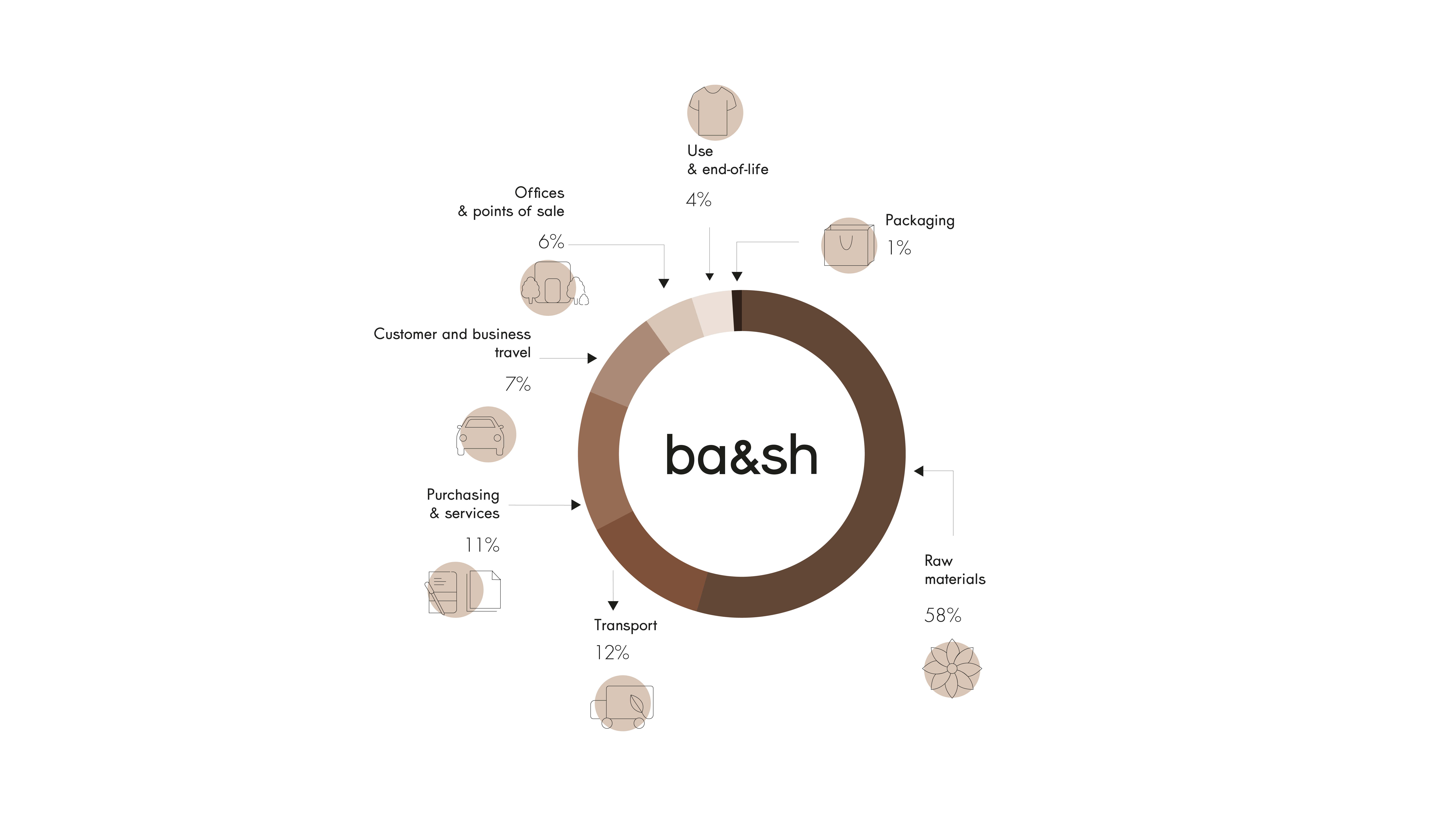
Focus on transport, our second greatest impact
Transportation is ba&sh's second largest source of emissions. In 2024, it will account for 12.2% of ba&sh's overall carbon footprint. Air transport still accounts for 17% of our transported volumes, compared with 75% by road and 8% by sea
2028 target:
Reduce the share of air transport to 15%
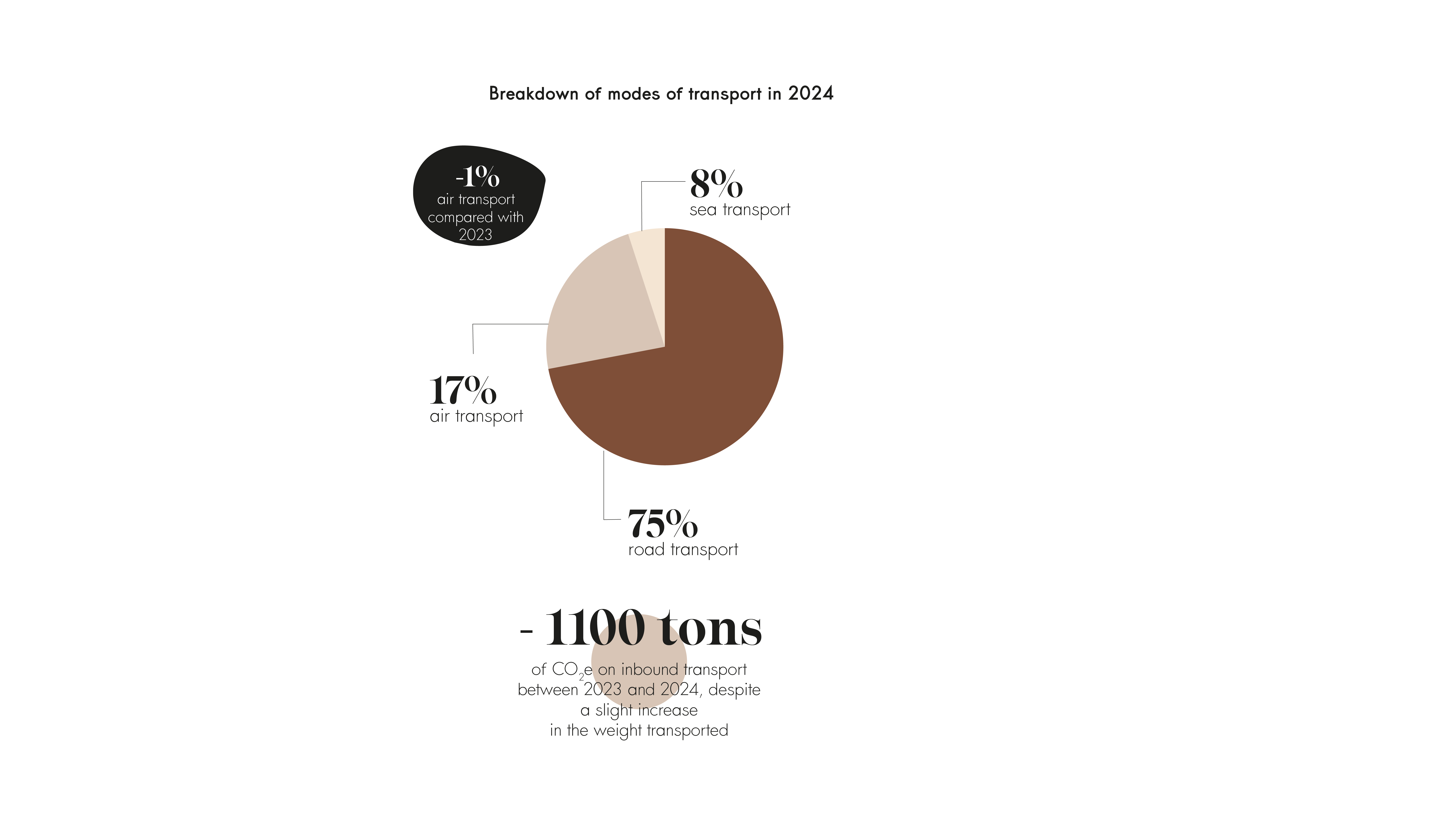
Adapting our infrastructures and practices






Adapting our infrastructures and practices
Headquarters
In France, our head office is now powered by a 100% renewable electricity contract.
3.1 tonnes
That's the amount of waste collected and recycled from our Paris headquarters by our partner Lemon Tri in 2024.
Lemon Tri is a labelled B Corp™ from the social economy sector that collects and recycles waste in France.
Stores
Our retail outlets account for 11% of our carbon footprint. In Europe, 92% of boutiques managed by ba&sh will be powered by low-carbon energy* by 2024. For our outlets in Asia and the United States, which are still heavily dependent on coal, we are still looking for alternative solutions.
2028 target:
100% of our points of sale in Europe and North America powered by renewable energy.
*Countries with a low-carbon energy mix: Switzerland, Norway, France, Sweden
Countries with a high-carbon energy mix: China, Germany, Belgium, Denmark, Spain, Luxembourg, Netherlands, Portugal, UK, USA, Canada.
Warehouse
ba&sh's worldwide logistics hub is located in a warehouse north of Paris. The building has been awarded the "Excellent" level of High Environmental Quality (HQE) certification and has been powered entirely by renewable energies since 2023.
All waste generated at the warehouse is collected and recycled by Paprec and Lemon Tri.
2028 target:
0% virgin plastic in logistics packaging.
At ba&sh, we advocate a holistic approach that simultaneously addresses climate and biodiversity, which are themselves interdependent. The production of raw materials and the manufacturing and processing of ba&sh garments have a major impact on biodiversity. ba&sh strives to reduce associated impacts in the following areas

In 2021, ba&sh worked with a specialized consultancy to assess the company’s impact on biodiversity. A specific action plan was established to complement our climate strategy.
Our actions focus on the following themes:
Production of materials:
Transformation processes (washing, dyeing, tanning, etc.)


To walk on the bright side is to confront the crucial issue of water in the textile industry, which both consumes significant amounts of water and can contribute to polluting it.
It means doing our part to reduce water consumption and the pollution of water that can occur along our supply chain.
We are taking decisive action concerning our most water-intensive materials and transformation processes:

Choosing certified or alternative materials, such as Ecovero®, which requires 50% less water than conventional viscose, or organically grown cotton, which requires 91% less water than conventional cotton (source: HIGG MSI).

Choosing Leather Working Group (LWG) certified leather: 100% of our tanneries will be LWG certified by 2024 and 70% of them are located in Europe. This certification is a guarantee of good environmental management - particularly with regard to water. ba&sh also prioritizes sourcing leathers tanned in Europe, which upholds higher standards in terms of water and chemical product management.

52% of our denims were washed in an eco-responsible way in 2024, scoring low (less than 33) on the EIM (Environmental Impact Measurement). Each piece required less than 35L of water to be washed - down from 80L for a conventional wash. A low EIM score also implies less chemical use, and therefore less risk of water pollution.

100% of our denim laundries have undergone an environmental audit in line with ba&sh requirements. ba&sh uses the BEPI methodology, which is based on 11 evaluation criteria, including energy consumption, greenhouse gas emissions, water consumption and chemical use.
In 2024, we carried out a comprehensive assessment of water consumption and pollution in our supply chain in order to establish a more ambitious action plan.
Our packaging
Packaging accounts for 1.4% of ba&sh's carbon footprint. Though not the most significant source of emissions, and because any progress is good progress, we are also seeking to improve on this front: ba&sh has joined the Pack4good initiative led by the environmental not-for-profit Canopy and is phasing out virgin plastic while gradually getting rid of superfluous packaging. We're also prioritizing recycled and certified materials (sourced from sustainably managed forests) for all packaging.
E-commerce
Our paper packaging for customers is made from 79% recycled paper, using wood pulp from sustainably managed forests, and is 100% recyclable.
In 2023, we broadened the scope of our circularity strategy to include packaging, in partnership with Hipli. Designed to be reused 100 times, the Hipli parcel is made from polypropylene, resulting in a significantly lower environmental impact than conventional packaging - its carbon footprint is 83% lower than that of a cardboard parcel. The Hipli parcel is now available for all e-commerce deliveries in France.

Stores
Our shopping bags are made from 80% recycled paper, and made from wood pulp from sustainably managed forests. Unfortunately, for reasons of strength, they cannot yet be made from 100% recycled paper.
As for our tissue paper, it is 100% recycled, made from wood pulp sourced from sustainably managed forests, and fully recyclable.
Warehouse
Since 2022, the little pouches designed to protect your ba&sh parts during transport, known as polybags, have been made from the same material, LDPE, which is 100% recycled and recyclable. We have looked into the possibility of “bio-sourced” plastic, considered compostable, but have ruled this out, as its environmental benefits have yet to be proven. What's more, no large-scale composting facilities exist.

Our targets

0%
virgin plastic in all our packaging, by 2030

100%
of packaging made exclusively from recycled paper and cardboard, using wood pulp from sustainably managed forests, by 2025
Frequently asked questions
Raw materials account for 58% of our carbon footprint. Hence, they constitute an essential lever for reducing our impact. To reduce our greenhouse gas emissions and help preserve biodiversity, we select our materials with care, always choosing the best possible option, such as organic or recycled fibres, or certified materials that guarantee animal welfare and sustainable pasture management, based on labels with the highest standards.
And when the best option is not possible - due to lack of supply, for instance - we select the next best alternative.
To find out more, visit the “Materials” section of our website.
Since 2019, ba&sh has assessed its carbon footprint yearly, using the GHG Protocol methodology across all its direct and indirect activities.
In 2024, ba&sh's activities generated 65,576 tonnes of CO₂e, equivalent to driving around the world 7,528 times or flying 37,020 times between Paris and New York.
Between 2023 and 2024, ba&sh reduced its carbon footprint by 5%.
This reduction has been made possible thanks to 4 key action levers: increasing the proportion of certified materials in our collections, reducing air transport, cutting our production volumes and switching to less carbon-intensive, renewable energy for our infrastructures (sales outlets, warehouse and head office).
ba&sh has established a strict social compliance policy, which is appended to the General Terms and Conditions signed by all suppliers.
We require direct suppliers to conduct a social audit every 2 years. We recognise only the most demanding international standards: BSCI, SMETA, WCA, ICS. Suppliers are assessed on social performance criteria including: working conditions, remuneration, decent working hours, health and safety, rights to freedom of association and collective bargaining, environmental protection... Following the audit, ba&sh works together with suppliers in implementing corrective measures to address any non-compliance.
Since 2023, ba&sh has been a member of Amfori, a business association that helps companies improving working conditions in their supply chains. As of this year, we will also be conducting environmental audits in our denim laundries.
In 2024, 94% of our tier 1 production sites had been audited.
Our goal is to have 100% of our Tier 1 production sites audited by 2025, and 30% of our Tier 2 sites by 2028.
To find out more, visit the "Partners" section of our website.
In 2024, 53% of our production came from medium-haul import regions (Europe, North Africa, Turkey) while 47% came from long-haul import regions (China, India). Between 2021 and 2024, 7% of our production was relocated from Asia to Europe and North Africa.
We have no intention of stopping here: by 2028, we aim to have 60% of our production sourced from medium-haul import regions (Europe, North Africa, Turkey) and 40% from long-haul import regions (China, India).
To find out more, visit the "Partners" section of our website or read our sustainability report.
B Corp™ certification is based on an assessment of a company's overall impact in seven key areas: Mission & Stakeholder Governance, Climate Action, Human Rights, Fair Labor, Justice, Equity, Diversity & Inclusion, Environmental Management & Circularity and Public Affairs & Collective Action. This assessment is conducted using a comprehensive questionnaire which the company must complete itself, providing documents to support each claim.
To achieve certification, a company must score over 80 points. The evaluation process is demanding and rigorous. In the case of ba&sh, it lasted 18 months.
As a B Corp™, we’re part of a global community of businesses that meet high standards of social and environmental impact.
Our animal welfare policy has recently been updated in line with the recommendations of animal welfare nonprofit Four Paws, who has also reviewed our policy. This document is appended to our General Terms and Conditions, which are signed by all suppliers.
In concrete terms:
- ba&sh is committed to increasing its share of certified animal raw materials (RWS, RMS, GRS) to 70% by 2028. The RWS, RMS and RAS labels guarantee animal welfare and sustainable pasture management at certified suppliers. The GRS label guarantees the recycled origin of recycled textile fibres.
- ba&sh has banned the use of fur as a member of the Fur-Free Retailer Program.
- ba&sh prohibits the use of exotic leather (e.g. crocodile, snake, etc.).
- ba&sh has banned the use of down and feathers.
- ba&sh has banned the use of angora.
- ba&sh prohibits the practice of mulesing as a signatory to the Brand Letter of Intent initiated by Four Paws.
- ba&sh only uses recycled cashmere.
To find out more, visit the "Materials" section of our website or read our sustainability report.




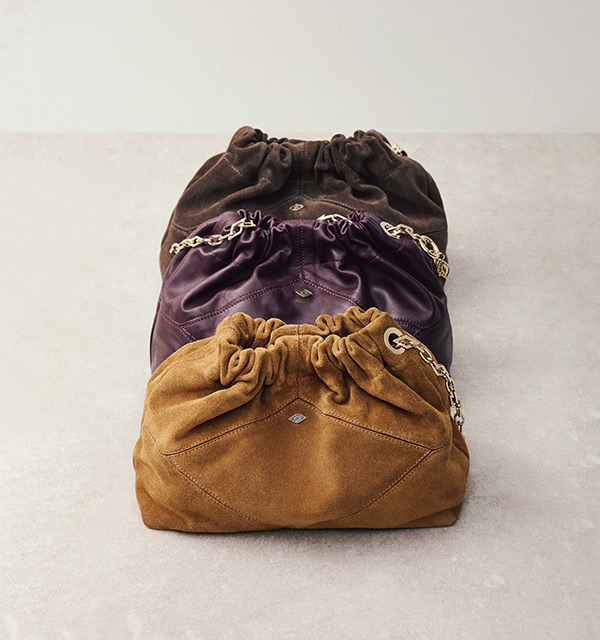




 CARBON FOOTPRINT REPORT 2024
CARBON FOOTPRINT REPORT 2024 